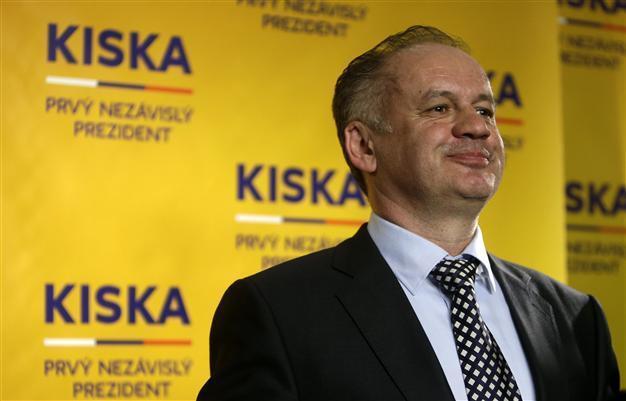Philanthropist elected first Slovak president with no communist past
BRATISLAVA - Agence France-Presse

51-year-old Kiska will be Slovakia's first president since independence in 1993 without a past in the Communist party. REUTERS Photo
Political newcomer and millionaire Andrej Kiska emerged out of nowhere to win a landslide in Saturday's presidential run-off, preventing veteran leftist Slovak Prime Minister Robert Fico from tightening his grip on power.A non-aligned centrist who made his fortune in the consumer-credit business, the 51-year-old Kiska will be Slovakia's first president since independence in 1993 without a past in the Communist party.
"I want to re-establish the people's trust in the office of president," Kiska said in a victory speech at his campaign headquarters in the capital Bratislava.
The millionaire-turned-philanthropist who has given away most of his fortune to charity also vowed to "make politics more human."
Fico, who will likely stay on as prime minister in the runup to a 2016 general election, conceded defeat as results showed Kiska winning a landslide.
Based on results from 99 percent the vote, Kiska scored 59.4 percent of the vote compared to Fico's 40.6 percent result, the election commission said.
"This election was a referendum on Fico and his government, and he clearly lost it," Grigorij Meseznikov, Bratislava-based analyst from the Institute for Public Affairs told AFP of the premier's failed attempt to monopolise power.
"The vast majority of voters have expressed their disillusion with Fico, he was unable to mobilise his core voters," he added.
A prospect of Smer winning control of both parliament and the presidency galvanised opponents in the ex-communist country of 5.4 million, which joined the European Union in 2004 and the eurozone in 2009.
Fico's party has a majority 83 seats in the 150-member parliament, with the next general election scheduled for 2016.
Analysts also warned that if he had taken the presidency, Fico could have tried to amend the constitution to boost presidential powers and transform the parliamentary system into a presidential one.
Crucially, Kiska sold himself as a bulwark against a Fico power grab.
"I voted for Kiska to prevent Fico from winning," Denisa Angyalova told AFP as she cast her ballot earlier Saturday in a sunny Bratislava, adding: "Fico is too power-hungry and I don't want one party to rule." Her sentiments were echoed by pensioner Stefan Horvath: "I voted for Kiska because he is not as corrupt as other politicians. He brings a breath of fresh air to politics and he understands people." Endorsed by heavyweight European Socialists like French President Francois Hollande and European Parliament chief Martin Schulz, veteran leftist Fico, 49, had tried to cast Kiska as politically naive and out of his depth.
But Kiska, who is widely regarded as a self-made man with a very good nose for business, capitalised on his image as a political greenhorn untainted by the kind of corruption allegations that have ravaged Slovakia's right wing. Politics here were rocked to the core late 2011 when a secret-service file, code-named Gorilla, leaked on the Internet revealed alleged links between oligarchs from a private financial group and nearly all of the right-wing political elite.
In the 2012 general election, angry voters ousted right-of-centre politicians and Fico won by a landslide, enabling him to form a one-party government backed by a strong independent majority in the parliament.
"Kiska's number one goal now should be to try to unify a very polarised Slovak society," Bratislava-based analyst Eduard Chmelar told AFP, pointing to the divisive election campaign.
"It's a new feeling to be voting for myself," said Kiska earlier Saturday as he cast his ballot in his provincial hometown of Poprad, in northern Slovakia.
He has revealed bouts of soul-searching and having "flirted" with Judaism and Buddhism before returning to Catholicism in his autobiography titled "A Manager's Road from Hell".
But Fico's bid to paint Kiska as an incompetent political novice dabbling in Scientology -- a claim Kiska denies -- fell flat with voters.
The incoming president will be sworn in on June 15, when leftist incumbent Ivan Gasparovic's second term ends.
Driven by electronics and car exports, the Slovak economy is set to expand by 2.3 percent this year.
















